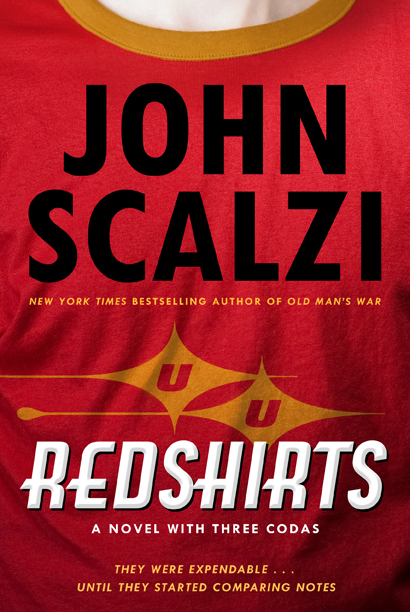The Universal Union is a space-faring empire. The Intrepid is the flagship of its space fleet. Its away team members keep dying. The Intrepid needs more crew. John Scalzi’s Redshirts is the story of that crew. It’s a “lower decks” novel (mostly decks 6 through 12), focusing on lower-ranking crew members and their intersections with command and adventure. Redshirts is a light, fast read, but it’s also a book whose questions about storytelling and agency stay with you long after you have put it down.
Redshirts owes an obvious debt to Star Trek in its many incarnations. The convention of killing off a low-ranking, previously unknown crew-member to create a sense of danger is one of the most common Star Trek tropes. Redshirts does not hesitate to lampoon the others as well. Scalzi’s dark humor is center stage for the first two thirds of the book. The hopes, superstitions, and desperate contrivances of characters facing death in bizarrely contrived situations convey a level of absurdity that keeps the story deceptively light.
Scalzi deftly blends science fiction clichés from the sudden acquisition of back story by characters who have just begun to decompose, to the urgency with which crew walk through hallways when a member of the command staff is around — with his characters’ pre-occupation with their own survival. Although the body count is high, the horrors the crew of the Intrepid face are carefully crafted to highlight Scalzi’s characters and their quest. He’s a writer on a mission, and he is devoted to these characters, not as people who must be saved at all costs, but as people whose lives and stories should not be wasted on poorly constructed narrative. In the book’s funniest moments, The Narrative itself is a character. The crew learns to spot its impact on their thinking (and on the Intrepid’s inertial dampeners), and constructs a theory of its motivations.
The horror and hilarity evident here have a purpose. Redshirts is not merely a satire of the conventions of popular science fiction as a genre (although it is an excellent satire), it’s a harsh critique of waste. Why should we allow ourselves to be thrilled and horrified by the senseless deaths of fictional characters when we could be equally entertained by the stories that those characters carry within them? When a character is eaten by an ice shark or a Borgovian land worm, or sucked out of a shuttle, Scalzi laments the loss of potential. His exposure of the pasts, motivations, and inner lives of his characters make compelling arguments for a more conservative approach to sentient life in works of fiction.
The final third of the book takes a more philosophical approach to this challenge. The characters struggle with mortality, as Scalzi’s characters tend to do, and deal with the many ways that lives are wasted in more realistic contexts. He makes a strong argument for agency here the death that results from a course of action that we choose is preferable to the death that results from a path that has been chosen for us. Is he talking about us, and not just fictional people? That’s a choice for the reader.
We’re left with a lot of choices for the reader here. In addition to the issue of the gratuitous waste of potentially fascinating characters, there’s the issue of clichés and allusions the extent to which a redshirt is or is not like a dark wood or a high mountain or any other more respected symbol. I want to disagree with Scalzi because I like clichés enough to elevate them, but his opposition to clichéd hackery, and the alternatives he proposes, are seductive.
Ellen Cheeseman-Meyer teaches history and reads a lot.










